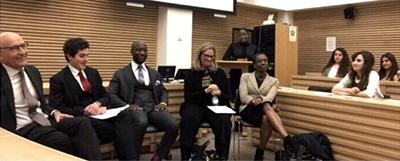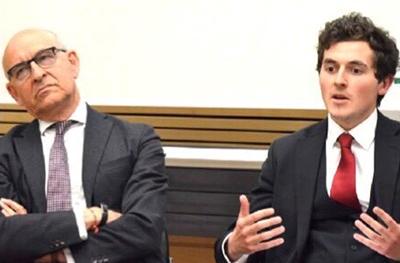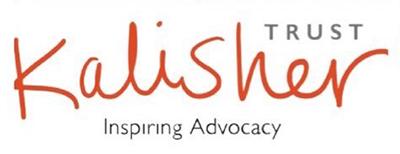Access to Excellence Open Day
Posted:
Time to read:
The Warden of Wadham College, Ken Macdonald, Lord Macdonald of River Glaven, QC, opened the day with an introductory talk on both study at Oxford and careers at the Bar. He described the University as an elite institution for the cleverest and most committed young people, but cautioned that elite does not necessarily mean elitist. Oxford is interested in recruiting the brightest and best students from wherever they may come. Indeed, contrary to popular perceptions, the majority of students at Wadham College attended state school. He encouraged all students in attendance to aim as high as they can. Regarding the Criminal Bar, the Warden stated it is a wonderful career for those interested in the law, and remains so despite government budget cuts. He gave a lively speech promoting the criminal bar, arguing that nothing is better than standing between the state and the individual, and no forum is more exciting, energising, or fearsome as the criminal trial. Furthermore, the Bar is becoming a more diverse profession; he argued that any student with the ability will be able to go the distance.

In taking questions from the students, he gave greater insight into the career of a criminal barrister. Students asked about how you defend a guilty person, which cases are hardest to defend, and how barristers keep up with ever growing legal knowledge. The Warden emphasised that trials are about testing the evidence, and that everyone is entitled to a defence. Across his distinguished career he has dealt with difficult cases, from defending terrorists to cases where the facts are particularly horrifying, such as child deaths. Finally, he explained that keeping up with legal knowledge is vital. A barrister must know the facts of their case inside out, and the law as it applies to those facts, which requires long hours of difficult, yet rewarding work.
The Kalisher Trust then provided a condensed version of their ‘Art of Advocacy’ workshop. The legal experts in attendance were distributed between the tables to speak to the students. Judge Topolski gave a similarly interesting background to his career. He began as a solicitor, and worked on defending a number of notable trials, including the Brighton hotel bombing. The Advocacy workshop is both about demystifying stereotypes about legal careers, and developing students’ confidence and ability to present a convincing argument.

Judge Topolski, in closing, gave the students his ten top tips for good advocacy. Advocacy should be:
- Audible
- Simple
- Clear
- Relevant
- Structured (opening your argument with “There are three points in this case…” is a good way to demonstrate this)
- Graphic (remember to use attractive language and / or pictures)
- Polite, occasionally funny
- Be Prepared
- Be Yourself
- Be Brief
Students then took lunch in Wadham College’s beautiful dining hall, before continuing on to the Centre for Criminology for a talk with Professor Mary Bosworth. Prof. Bosworth talked the students through her fascinating career, from focusing on women’s prisons to her current work on Immigration Detention Centres. Prof. Bosworth is always engaging and clearly passionate about outreach; indeed, some of the students found her work so interesting they stayed behind to ask further questions, and one discussed writing an Extended Project on prisons, referencing Prof. Bosworth’s work. Reiterating the message of the day, Prof Bosworth emphasised that the primary aspect academics look for in applications is engagement with and passion for the subject.
On the subject of applications, the final talk of the day was delivered by Dr Hugh Munro, who provided a workshop on university applications and personal statements. He first discussed what students need to think about when choosing courses, universities, and colleges. Key pieces of advice included picking a subject you love, rather than one you think will lead to a career, to be careful when accepting offers, and making sure you don’t rush to accept the first or lowest you receive.
While deadlines, admissions tests, and interviews were briefly dealt with, personal statements were the key focus. Dr Munro advised that statements should reflect skills. Personal statements are a forum for students to sell themselves as a potential asset to the university, which means answering the following questions: why are you drawn to your subject? what questions do you have about it? why would you like to spend time studying it? what do you enjoy at A Level that feeds into your course choice? This can be difficult, as many students struggle to articulate why they want to do things. Dr Munro’s top tips are:
- Avoid clichés, as admissions officers are sick of them.
- Don’t copy templates online, or you will just blend in to the crowd.
- Don’t lie, as you will be caught at interview!
- Don’t be too quirky, or you may find yourself standing out for all the wrong reasons.
- Show passion, without using the word ‘passion’.
To help demonstrate passion, students could consider taking part in super curricular activities. To name but a few of Dr Munro’s suggestions, they could sign up for Massive Open Online Courses (MOOCs) such as those offered by edX or FutureLearn, watch Ted Talks on subjects that interest them, or enjoy the free resources available on Oxford Sparks. These resources can provide important points for discussion on personal statements, and demonstrate engagement with their subject, and a passion for learning. When writing about things they’ve done, students were reminded to emphasise the knowledge and skills they took from their experience, rather than just listing them. In aid of this, Dr Munro advised that all writing in a personal statement should pass the ‘so what?’ test. A good framework for this is for students to follow up what they did with an explanation of what they found interesting about this, what skills they demonstrated, and what they did next.
Of course, the university admissions process and personal statement writing can all be rather daunting. In closing, Dr Munro encouraged students to not fear the blank page. Personal statements are never perfect in the first draft, so the most important thing is just to get writing!
Overall, the day was a rousing success. The Kalisher Trust noted the exceptional quality of the students who took part, and in turn the students engaged with, and learned from the day. All parties involved—both schools, Wadham College, the Kalisher Trust, and the Centre for Criminology—should congratulate themselves on how the day went. Most of all, congratulations to Anu and Elspeth for organising such a successful access day event, which is hopefully the first of many more to come.

Post by Toni Brunton-Douglas
MSc Criminology and Criminal Justice Graduate
Share:
